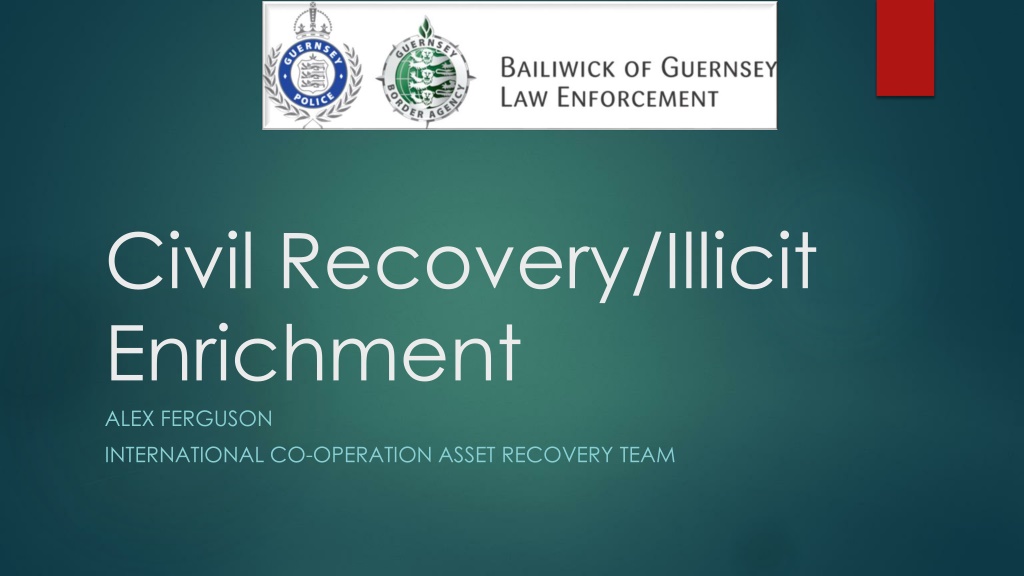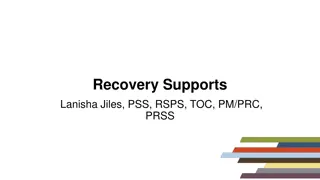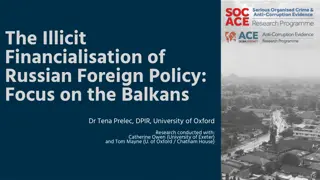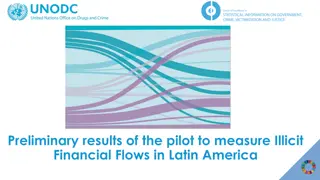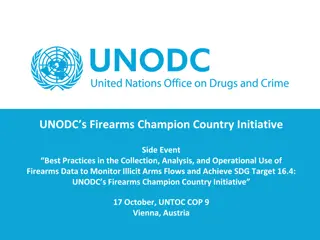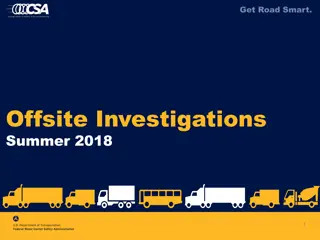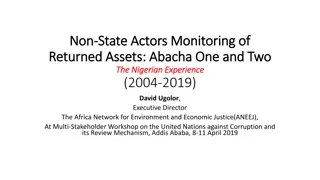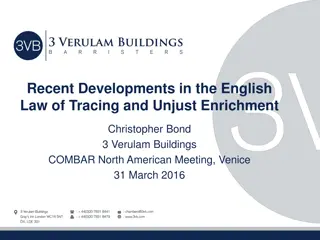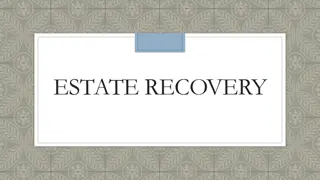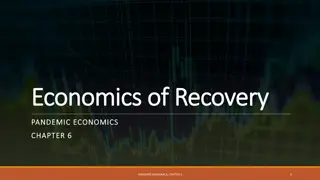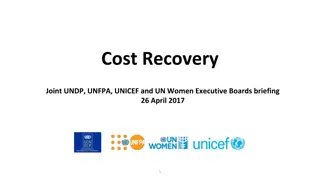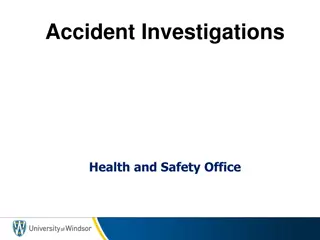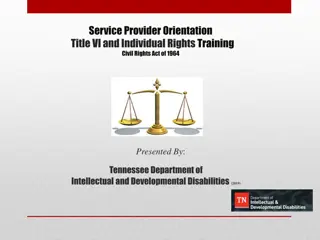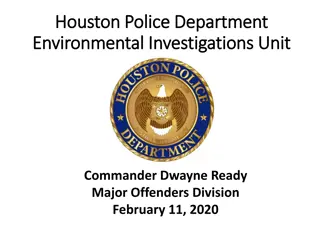Understanding Civil Recovery and Illicit Enrichment Investigations
Civil recovery is a powerful tool in tackling crime where securing a conviction is challenging or not feasible. It focuses on recovering assets obtained through unlawful conduct, shifting the emphasis from individuals to properties. This approach proves effective in cases where post-conviction confiscation fails, especially in combating sophisticated organized crime networks. By targeting assets over individuals, civil recovery investigations aim to disrupt criminal activities and recover illicitly acquired wealth for the benefit of the state.
Download Presentation

Please find below an Image/Link to download the presentation.
The content on the website is provided AS IS for your information and personal use only. It may not be sold, licensed, or shared on other websites without obtaining consent from the author. Download presentation by click this link. If you encounter any issues during the download, it is possible that the publisher has removed the file from their server.
E N D
Presentation Transcript
Civil Recovery/Illicit Enrichment ALEX FERGUSON INTERNATIONAL CO-OPERATION ASSET RECOVERY TEAM
Objectives What is Civil Recovery? What is a civil recovery investigation? Case Study; Illicit Enrichment/Unexplained Wealth; Case Study.
What is civil recovery? Civil recovery powers can make an important contribution to the reduction in crime where: It is not feasible to secure a conviction; A conviction is obtained but a confiscation order is not made; The suspect or defendant has died before conviction; A defendant is acquitted; The relevant authority takes the view that there is insufficient evidence to prosecute; The above is not an exhaustive list
Why civil recovery over post conviction confiscation? The UK in particular (but is not alone) has an organised crime problem which is growing ever sophisticated; 4,542 organised crime gangs were mapped in the UK in 2018; It is becoming harder and harder to convict criminals; Post conviction confiscation is not working; It can be more effective to target assets over individuals; Non conviction based forfeiture is emphasised in the 2018 Serious and Organised Crime Strategy.
Civil Recovery investigation An investigation into whether identified property is recoverable property, i.e. it has been obtained through unlawful conduct; The focus changes from the person to the property; Unlawful conduct is often defined as any conduct occurring in a jurisdiction that is unlawful under the criminal law, or any conduct occurring outside the jurisdiction which had it occurred in the jurisdiction would be unlawful under the criminal law; Property freezing orders can be obtained whilst the investigation is ongoing on the basis that there is a good arguable case that the property is recoverable; No allegation of a specific criminal offence is required, a description of a particular kind or kinds of unlawful conduct through which the property is obtained will suffice; Terminology is different from a criminal case. In a civil case the claimant brings the action and the respondent would be the person arguing the property does not come from unlawful conduct; On the making of a recovery order the property will then transfer to the state to be realised.
Civil Standard of Proof In a civil recovery case the civil standard of proof on the balance of probabilities applies This was considered by Griffiths Williams J in SOCA v Gale and others [2010] EWCA Civ 759: The burden of proof is on the claimant and the standard of proof they must satisfy is the balance of probabilities. While the claimant alleged serious criminal conduct, the criminal standard of proof does not apply, although cogent evidence is generally required to satisfy a civil tribunal that a person has been fraudulent or behaved in some other reprehensible manner. But the question is always whether the tribunal thinks it more probable than not.
Evidence Used in Civil Recovery Cases Previous convictions; Evidence from failed prosecutions/investigations; Intelligence; Criminal Associations; Hearsay evidence is admissible
Cases On 14thAugust 2019 the National Crime Agency announced that it had obtained account freezing orders in respect of 100 million. NCA v Vlad Luca In May 2018 the NCA obtained 3 account freezing orders in respect of a 22 year old student; Luca was the son of the ex Moldovan prime minister who is currently serving a prison sentence for corruption offences; Luca paid 390,000 up front in rent for a Knightsbridge penthouse;
Cases (continued) Luca led an extravagant lifestyle, spending significant sums of money on luxury goods and services, including a 200,000 Bentley Bentayga bought from a Mayfair dealership; Nearly 500,000 was forfeited and costs awarded in the sum of 4,079. With no registered income in the UK, HSBC records showed that the Vlad Luca s accounts and living expenses were funded by large deposits from overseas companies, mainly based in Turkey and the Cayman Islands. Multiple cash deposits were also identified across the UK branch network, with 98,100 paid in over one three-day period;
Illicit Enrichment & Unexplained Wealth The concept of legal frameworks and approaches to addressing criminal as well as suspicious wealth are not new. Confiscation legislation adopted by many jurisdictions contain aspects of the concept of unexplained wealth. For example upon conviction for certain offences courts can make assumptions that property and expenditure has come from crime unless the defendant is able to produce evidence to the contrary. In contrast other jurisdictions have adopted offences of illicit enrichment as outlined in the United Nations Convention Against Corruption. Only five jurisdictions have fully adopted legislation that provides for courts to make Unexplained Wealth Orders (UWO) or to forfeit property based upon unexplained wealth: Australia; Barbados Ireland; Trinidad & Tobago United Kingdom.
Types of unexplained wealth orders There are two types of UWO in existence which are based upon the same principals, they are orders made under the civil rather than the criminal law and once the application is made to court there is a reverse burden placed on the respondent to justify how they were able to obtain their assets and wealth. The UWO regimes provide for non-conviction based asset forfeiture/confiscation that do not require a predicate offence. The first type of UWO is an investigative order and the evidence that is obtained from the respondent can then be used to obtain a civil recovery order against property. Barbados and the United Kingdom has adopted this approach. The second type of UWO is an order from a court for property to be forfeited or for a payment to be made into court based upon an assessment of an individual s total wealth compared against what they can legitimately afford. Australia, Ireland and Trinidad & Tobago have adopted this approach.
The United Kingdom - The Context Financial profit is the driver for almost all serious and organised crime and other lower level acquisitive crime. The best value estimate of the amounts laundered globally are equivalent to 2.7% of global GDP or US$1.6 trillion..The NCA assesses that billions of pounds of proceeds of international corruption are laundered into or through the UK. Her Majesty s Revenue and Customs estimate that over 4.4 billion was lost to attacks against the tax system in 2013/14. The UK s drug trade is estimated to generate revenues of nearly 4 billion each year Explanatory Notes to Criminal Finances Act. There is no reliable estimate of the total value of laundered funds that impacts on the UK. However, given the volume of financial transactions transiting the UK, there is a realistic possibility the scale of money laundering impacting the UK is in the hundreds of billions of pounds NCA National Strategic Assessment of Serious and Organised Crime 2018. UWO s were primarily introduced to target grand corruption and are a means of obtaining information against persons and property where little is available.
Proceeds of Crime Act 2002 Part V Unlike the regime in Australia and Trinidad & Tobago, a UWO is a civil power that can be used to compel respondents to provide information and it is not a power to recover property. The power to obtain UWOs is limited to 5 enforcement authorities which include the National Crime Agency and the Serious Fraud Office. A UWO can only be obtained against two categories of persons: Those persons who are reasonably suspected of involvement in, or of being connected to a person involved in serious crime; or A person who is a Politically Exposed Person (PEP). The respondent must hold property that exceeds 50,000 in value. This can be aggregate value and the value of the respondent s interest in the property is not taken into account. There must be reasonable grounds to suspect that the respondent s known and lawfully obtained income would not permit them to acquire such property.
Serious Crime This is any offence that is contained within Schedule 1 of the Serious Crime Act 2007, this includes drug trafficking, people trafficking, money laundering and Fraud. Politically Exposed Person an individual who is, or has been, entrusted with prominent public functions by an international organisation or by a State other than the United Kingdom or another EEA State, a family member of a person within paragraph (a), known to be a close associate of a person within that paragraph, or otherwise connected with a person within that paragraph. Unexplained Wealth Order It is an order from the court which requires a respondent to explain: The nature and extent of their interest in a specific property; and How the property was obtained If the respondent fails to respond without reasonable excuse the property is assumed to be recoverable or the responses provided can be used in any further civil action.
The case of Mrs A National Crime Agency v Mrs A (Rev 1) EWHC 2534 Zamira Hajiyeva Jahangir Hajiyev
The Case 28 February 2018 first UWOs obtained against Jahangir Hajiyev (Jahangir) and Azerbaijani banker and his wife Zamira Hajiyeva (Zamira) relating to two properties; A residential property in Knightsbridge which was purchased in 2009 for 11.5M by BVI registered company; Mill Ride Golf Club, Ascot, Berkshire, which was bought by a Guernsey based finance company in 2013; Current estimated value of the property is 22M; Interim freezing orders were also obtained. July 2018 the case came back to court and Zamira argued that the properties and the wealth used to obtain them were in proportion to her husbands earnings and investments from being a fat cat banker ; Jahangir is currently serving a 15 year prison sentence imposed in 2016 for fraud. He was the chairman of Azerbaijan s biggest bank. The state had a controlling interest in the bank; The court was informed that Zamira had spent over 16M at Harrods over the past decade; 3 October 2018 the High Court dismissed her challenge and she will now be compelled to reveal the source of the wealth or risk losing the properties as part of a civil recovery order claim.
The Case (continued) In November 2018 the NCA seized 49 items of jewellery from Christie s auction house, worth 400,000; Among the items seized were: A Van Cleef & Arpels pearl necklace which was valued at 20,000 despite having originally been purchased her husband in San Moritz in 2008 for 280,000; and A Boucheron sapphire and ruby necklace valued at up to 120,000.
Alex Ferguson Alex.ferguson@gba.gov.gg af1973@Hotmail.co.uk +447901215333
